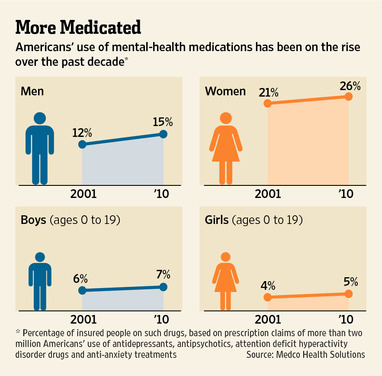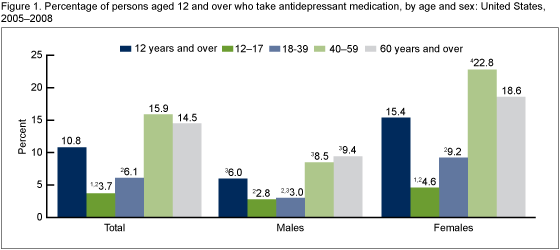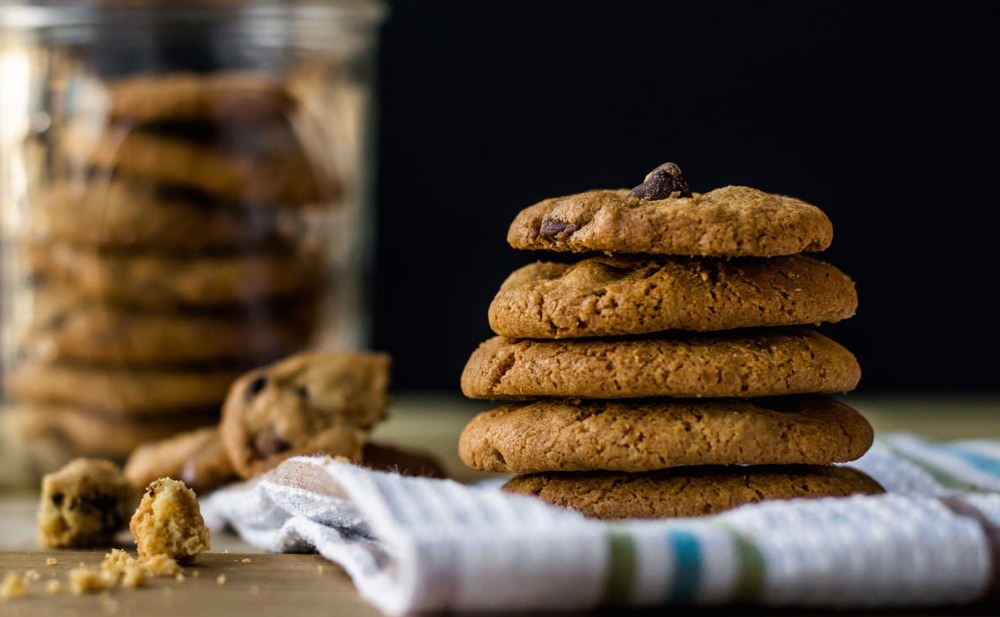
Can Your Diet Make You Happier? The Surprising Truth Behind The Diet That Fights Depression

Is Your Diet Making You Depressed?
Antidepressant usage has increase almost 400% over the past few years.
23% of women in their 40s and 50s take antidepressants.
Women are 2 1/2 times more likely to take an antidepressant than men.
And interestingly enough, antidepressant usage does not vary by income level.
In other words, it’s safe to say there’s a health, happiness, and antidepressant prescription epidemic going on in this country (USA).
So why are people so miserable? Or why are antidepressant medications on the rise?
And If I’m depressed, what can I do about it?
Antidepressants, the scary truth
Percentage of people age 12+ who are taking antidepressant medication (United States):

Center for Disease Control: http://www.cdc.gov/nchs/data/databriefs/db76.htm
The scary part about depression is that there is rarely just one treatment that will fix it.
If you’re ‘unhappy’ how are you supposed to fix that?
Are you unhappy because you hate your home life?
Are you unhappy because you can’t stand your job?
Are you unhappy because you’re unhealthy?
Even when you look at antidepressants, a small percentage, around 30% respond to the first antidepressant alone. Any person who has seen a doctor claiming they’re “depressed” knows this – there is a trial period where you experiment with several antidepressants including combinations, in order to figure out which works best.
There’s just one problem.
Some antidepressants have not been shown to be any more effective than a placebo.
What’s even scarier? A review of antidepressant trials submitted to the US FDA by the industry for drug approval showed when a trial was successful, the results were published 94% of the time, however when the trial was not found to be more effective than the placebo, it was only published 50% of the time. In other words there was a heavy amount of bias in reporting. Overall the drugs were about 51% effective.
What that means is that the information we receive is very one sided – when a drug doesn’t work or hasn’t been shown to be much better than a placebo, we rarely hear about it. But when one drug is shown to be marginally better – sometimes barely more effective than the placebo – several hundred studies blow up about it’s “effectiveness.”
[ Note: If you are on antidepressants, please continue to take them. My post is not trying to convince you to stop taking them. My point is that, in addition to them, you should be experimenting with many other lifestyle and nutritional factors to improve your mood and health. ]
***
On the happiness front, despite people getting wealthier and more privileged, people aren’t getting any happier. And arguably people today aren’t any happier than 2,000 years ago when Aristotle was philosophizing about the nature of happiness.
But rather than me talking about all the myriad ways to get happier, today I want to emphasize just one thing: your diet.
Can Your Diet Actually Make You Happier?

With all craziness about the depression statistics and how unhappy people are these days, I became curious – does what you eat actually make you happy or at least influence it?
I knew that emotional eating existed for very real physiological reasons – that sugary, salty, and fatty foods literally are like taking a valium and popping a pill in the short run.
Food produces real, physiological relief in the brain. Fact.
So what specifically produces relief – and how much?
The Mediterranean Diet & Depression
One study tested several thousand people aged 65+ over the course of several years to see if there was a correlation between depressive symptoms and diet over time.
Over a 7 year follow-up, the people on the Mediterranean diet had a decreased incidence of depressive symptoms. The rate of depressive symptoms developing was 98.6% lower among people in the top 1/3 versus the lowest 1/3.
(The Mediterranean diet is essentially veggies, fruits, whole grains, fish).
Another study found that the Mediterranean diet will lower the chance of depression.. while fast food increases the chances of depression.
What about specific nutrition and depression?
One study mentions that the kind of food habits that happen pre-depression are often similar to people currently depressed: skipping meals, poor appetite, lots of craving for sweets.
Also, based on the dietary intake of many Asian and American countries, our diets are deficient in a handful of nutrients and vitamins, like essential minerals and Omega-3 fatty acids. What’s interesting is that the diets of patients suffering from mental disorders reflects something similar but more severe.
Part of the link between diet and mental health is that neurotransmitters in the brain require optimal nutrients to be formed.
Consider some other nutrition and depression facts:
- For example, taking amino acid supplements has been found to reduce symptoms of depression and mental disorders because they aid in the formation of neurotransmitters in the brain. (Yay to eating protein…)
- Depressed people often show under-adequate nutrition.
- The decline of omega 3 fatty acid consumption has also been linked to the incidence of major depression in modern people. The two omega fatty acids in fish oil, EPA and DHA, have been found to have anti-depressant qualities
- Vitamin B (folate) and magnesium deficiencies have also been linked to depression, with supplementation showing improvements, often rapidly
Overall: the most common nutritional deficiencies in patients with mental disorders tend to be: omega-3 fatty acids, B vitamins, and amino acids that are precursors to neurotransmitters.
Also studies have repeatedly linked high fish consumption to low levels of mental and depressive disorders. Eat those sardines!
What About Carbs, Proteins, and Oreos? Ice Cream Makes me Feel Good…

Here’s the interesting part:
Carbohydrates
- A diet too low in carbohydrates can make depression worse. The reason for this is because carbohydrate rich foods release serotonin and tryptophan, which help regulate mood. Don’t go too low carb!
- High GI foods (the ones you know not to eat like candies, sugar, white bread) spike your mood rapidly, but their effect decreases rapidly too.
- Low GI foods (typical health foods – proteins, vegetables, whole grains, etc.) have a less noticeable effect on mood, but it’s more sustained.
Proteins
Your body has 12 amino acids, 8 of which are essential and are obtained via the diet. If your diet is lacking in proteins, lack of amino acids mean there won’t be optimal neurotransmitter synthesis which has been linked to low mood and aggression in studies.
Folate
Depressive symptoms are one of the leading symptoms behind folate deficiency, in fact, one study found that in 15-38% of adults diagnosed with depressive issues, low or deficient folate levels were present.
…So Where Do I Get All This Depression-Fighting Awesomeness?
Okay, I get it, so my diet influences my mood.
Maybe that fast food is doing a lot more inside of me than just clogging my arteries. Maybe soda and potato chips are doing more than just expanding my waistline.
… But where am I supposed to get all this stuff? Supplements?
Nope!
I stick by my advice that the only food rule you need to worry about is this: just eat real food.
[Note: Incase you forgot what that was, this is the article all about real food – pretty pictures included!]
Real food means that you’ll be eating plenty of fish – which will give you those great Omega 3’s that you need.
Real food means that you’ll eat tons of veggies like dark leafy greens (spinach, collards, kale) which will give you Folate , the magical anti-depressive B vitamin. You’ll be getting magnesium from other foods like avocados, fruits, beans, nuts.
Real food means you’ll be getting good quality grass-fed beef and good chicken – which will give you all the amino acids necessary to build neurotransmitters optimally and keep your energy levels stable throughout the day.
Real food is also low GI – it keeps you fuller, longer, it doesn’t spike blood sugar as quickly, and it helps manage sugar cravings.
Real food has got your back!
The Magic Bullet For Depression?
Health has MANY aspects.
You can take a person who eats right and exercises, but hates their job and home life, and they’ll show symptoms of health issues.
There is so much more to health and depression than simply food and movement. The brain plays an enormous role.
Is there a magic bullet for depression? Yeah. It’s called eating right, having a job you love, having close friends and family, keeping stress levels low, getting enough sleep, not taking life too seriously, and moving as much as possible.
This is the entire “secret” behind optimal health. Diet is just a small but important facet of optimal health and happiness.
What About You?
Have you noticed your diet affecting your mood?
Tell me about it in the comments section below.
— Alex
P.S. Stop by Facebook and add Modernhealthmonk.
Some images via Freedigitalphotos.net

I am trying to purchase a copy of your book but I can only find the kindle version. I was hoping to purchase a real book and not an ebook.
Rosie Wright
Hi Rosie,
What country are you trying to purchase it in? It’s in print in most countries (including USA). What does it say when you try to buy it?
Here’s the print one: http://www.amazon.com/Master-Day-Better-Power-Habits/dp/0692578269/ref=sr_1_1?ie=UTF8&qid=1459552271&sr=8-1&keywords=master+the+day